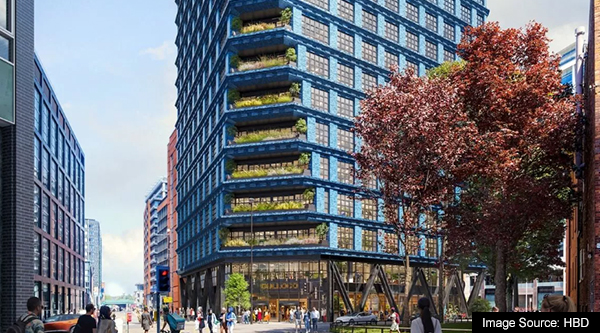The Architects Registration Board (ARB) has published new research on the workplace culture experienced by architects and how this shapes the quality of the work they deliver.
The research was conducted by the independent agency Thinks Insight & Strategy in 2024 through a survey of 898 architecture professionals across different career stages and further detailed interviews with 15 of the research participants.
ARB commissioned the research to support the development of a new Code of Conduct and Practice for architects, and following concerns professionals raised through ARB’s education survey and wider engagement events about mistreatment and misconduct in the sector. The research is also informing the work of the Professional Practical Experience Commission, that will make recommendations to ARB in early 2025.

The research found that:
- Architecture professionals suffer from higher levels of discrimination and sexual misconduct than in other professions that publish similar research – including academia and parts of the medical profession.
- Over a third of all professionals working in architecture have experienced insults, stereotypes or jokes relating to protected characteristics.
- One in four female professionals has experienced unwelcome sexual advances.
- A third of professionals would not feel confident raising concerns if they experienced or observed misconduct.
Alan Kershaw, Chair of the Architects Registration Board, said: “Architects play a vital role in society. The public rely on their competence and need them to behave ethically, to treat people with respect, and to raise concerns should they have any. The vast majority of architects are good professionals who behave ethically. But we are appalled to learn that many of them suffer higher levels of discrimination and sexual misconduct than some other professions. There is a clear need for leadership here; all professionals in the built environment sector need to support a better culture for a better built environment.”
In response to the research findings, ARB will set firmer professional standards for architects through a new Code of Conduct and Practice with supplementary guidance on leadership and inclusion, provide tools to support them in raising concerns and challenging unethical behaviour, and collaborate with other sector leaders to promote changes in behaviours and conduct. ARB is also writing to learning providers of ARB-accredited qualifications to highlight the research and a new condition on sexual misconduct being introduced by the Office for Students, the education regulator in England.
Muyiwa Oki, President of the Royal Institute of British Architects (RIBA), said: ”RIBA is deeply concerned by the findings of ARB's research, which reveals widespread discrimination and sexual misconduct in the profession. This type of behaviour cannot—and will not—be ignored. While some practices are already leading by example, encouraging inclusive and respectful cultures, the evidence is clear that the entire profession must act.
“Championing changes to improve workplace wellbeing is a priority for RIBA, and we recognise both our unique, important role in achieving this, and the work it will take. As we prepare to publish the findings of our own investigation, we are ready to take bold steps. We continue to work with ARB and others to enable a profession that is rooted in safety, respect, and inclusion for everyone.”
Mark Thompson, Managing Partner at Ryder Architecture, said: “The evidence starkly illustrates the failures of our sector and the importance of embedding an inclusive and supportive culture. This needs to be more than rhetoric and policy statements, but a tangible shift in mindset, which is why we welcome the new Code of Conduct and Practice. Ryder prides itself on cultivating genuine shared values, based on equity and mutual respect, and we have invested significant time in a practice wide consultation with our people. These shared behaviours are communicated at all stages of a person’s career at Ryder – we have a zero tolerance approach and will call out failure to meet our standards and take action. The architectural community needs to wake up to the damage it is causing to its people, quality of work and reputation through the persistence of toxic behaviours.”
Examples given by participants in the research demonstrate that cultural issues are not unique to architects and are spread throughout the built environment sector. Architects have described inappropriate behaviours on construction sites or in client meetings, and they also share some examples that start at university. The Grenfell Tower Inquiry’s final report also underscored the importance of ethical behaviour and a culture that supports good decision making across the built environment sector.
ARB is encouraging architects and others working in the sector to respond to the public consultation on its proposed Code of Conduct and Practice, which includes the new firmer standards for conduct. The consultation will close on 12 December 2024 and is available online here.
On the culture of workplaces in the architecture sector, the research found that:
- Architects feel they embody many of the values and attributes the public and clients would expect of the profession (integrity, honesty, commitment and accountability) but not all (empathy, respect, inclusion, and confidence raising concerns).
- Only half of professionals agree the working environment is inclusive. This drops lower for underrepresented groups including women, ethnic minorities, and professionals with disabilities.
- Architects are concerned about lower quality of work, ethical behaviour and wellbeing as a result of excessive workloads and hierarchies that sometimes create significant power imbalances.
On the issue of misconduct in the profession, the research found that:
- Significant proportions have experienced bullying (41%), discrimination (33%), and sexual misconduct (10%). Not many sectors publish similar statistics for comparison, but architecture lags behind several that do.
- Over a third (38%) of all professionals have experienced insults, stereotypes or jokes relating to protected characteristics; this is higher for female professionals (53%), those from ethnic minorities (46%) and those with disabilities (46%).
- Nineteen per cent of all professionals and 38% of female professionals have experienced unwelcome sexual comments. Twelve per cent of all professionals and 24% of female professionals – one in four – have experienced unwelcome sexual advances.
- A third of professionals would not feel confident raising concerns if they experienced or observed misconduct. They doubt it will be taken seriously and they fear it will impact their career. There is also a lack of clarity about the correct process.
Eddie Weir PCIAT PPCIAT, President of the Chartered Institute of Architectural Technologists (CIAT) said: “This research makes for uncomfortable reading for those of us who are leaders in the building design sector. Although it highlights examples of good practice, which are to be commended, the report’s overall findings are disquieting. In short, many professionals in our sector are working in contexts which leave them feeling undervalued and over-worked and, all too often, individuals are suffering bullying or harassment. Such behaviours are unacceptable, and CIAT commends ARB for undertaking this timely research to shed light on issues which some would prefer remain hidden.
“While this report focuses on registered architects and trainees, it would be naive to think that the issues it highlights do not extend to other built environment professions. As individuals, we all have a duty to ensure that we are creating safe, supportive environments in which our colleagues can deliver great work. And this duty falls doubly on those of us with leadership responsibilities, whether in professional bodies such as CIAT, or in our own practices.
“Early next year, CIAT will be publishing our new, enhanced and strengthened Professional Standards Competency Framework, which clearly sets out the expectations on CIAT members and affiliates, not only in their professional and ethical conduct, but also their behaviour in the workplace and society. I encourage anyone who has concerns about the conduct of a colleague to get in touch with CIAT or the relevant professional body, as well as to make use of the protections afforded by UK employment law (or the equivalent law in the jurisdiction in which they practise). I would also commend the support and advice provided by the Architects Benevolent Society (ABS) to anyone in our professions who may be experiencing difficult times. As President of ABS, I’ve often expressed how much I admire the way it remains a symbol of hope and support for those within and close to our architectural family. More information on the support available through ABS can be found at absnet.org.uk.
“For my own part, I will be reflecting on this report over the coming days, to ensure that my practice is providing the sort of environment which people are pleased to work in. I encourage all of you to do the same.”




















